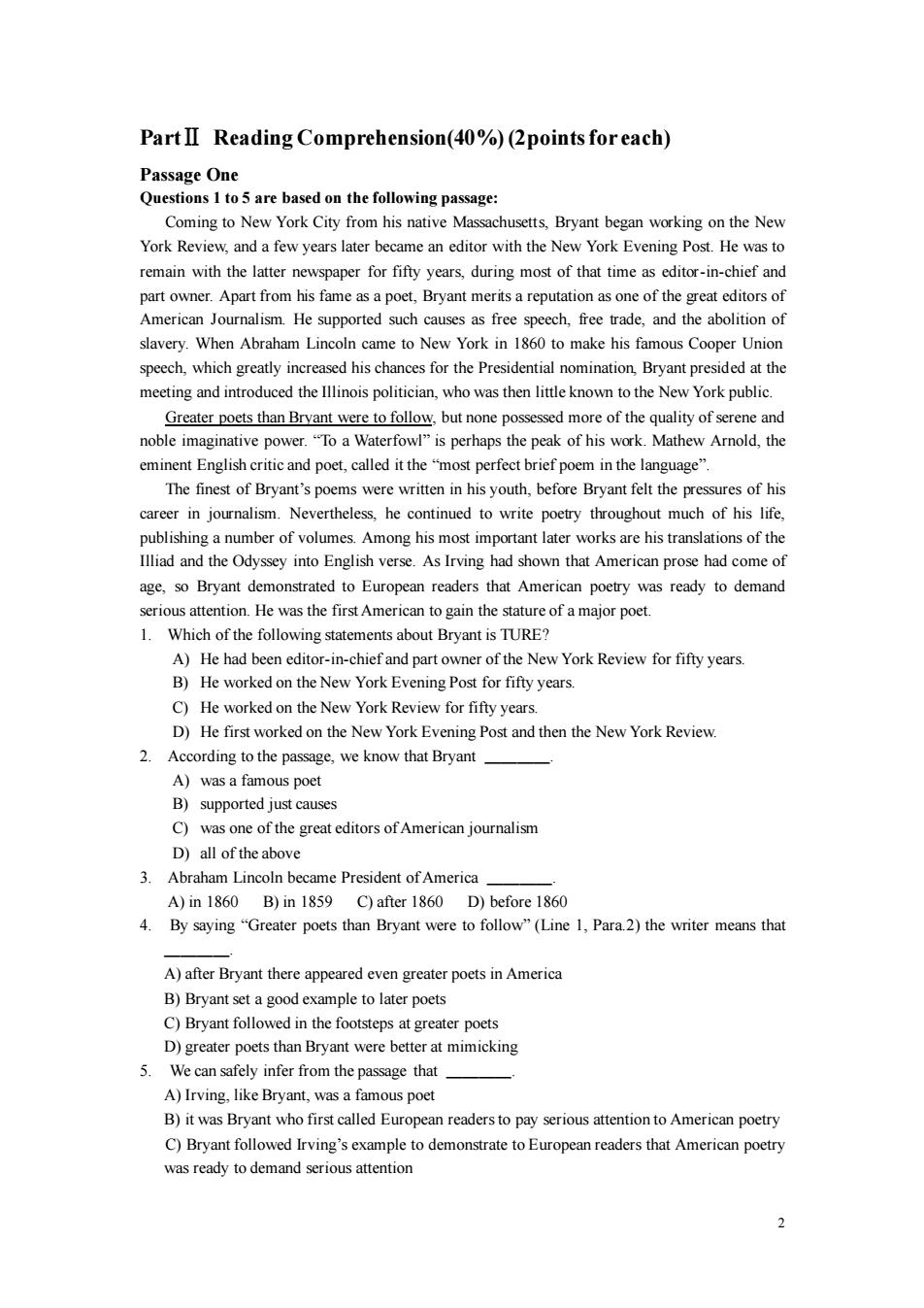正在加载图片...

Part II Reading Comprehension(40%)(2points for each) Passage One Questions 1 to 5 are based on the following passage: Coming to New York City from his native Massachusetts,Bryant began working on the New York Review,and a few years later became an editor with the New York Evening Post.He was to editor-in-chief and part owner Apart from his fame as a poet,Bryant merits a reputation as one of the great editorso American Journalism.He supported such causes as free speech,free trade,and the abolition of slavery.When Abraham Lincoln came to New York in 1860 to make his famous Cooper Union speech.which greatly increased his chances for the Presidential nomination Bryant presided at the meeting and introduced the lllinois politician,who was then little known to the New York public. vant were to fol low,but none po edmore of the quality of serene an noble imaginative power."To a Waterfowl is perhaps the peak of his work.Mathew Arnold,the eminent English critic and poet,called it the"most perfect brief poem in the language" The finest of Bryant's poems were written in his youth,before Bryant felt the pressures of his career in jounalism.Nevertheless,he continued to write poetry throughout much of his life. ant late By5网Va3Aa4 liadand nong his f the age,so Bryant demonstrated to European readers that American poetry was ready to demand serious attention.He was the first American to gain the stature of a major poet 1.Which of the following statements about Brvant is TURE? A)He had been edito n-chief and part er of the New York Review for fifty years worked on the New York E Evening Pos for fifty years C)He worked on the New York Review for fifty years. D)He first worked on the New York Evening Post and then the New York Review 2.According to the passage,we know that Bryant A)was a famou s poet supported jus se C)was one of the great editors of American journalism D)all of the above 3.Abraham Lincoln became President ofAmerica A)in 1860 B)in 1859 C)after 1860 D)before 1860 4.By ying"Greater ets than ant t vere to follow"(Line 1.Para2)the writer means that A)after Bryant there appeared even greater poets in America B)Bryant set a good example to later poets C)Brvant followed in the footsteps at greater poets D)greater pocts than Bryant wer e bet at mimicking A)Irving,like Bryant,was a famous poet B)it was Brvant who first called European readers to pay serious attention to American poetry C)Bryant followed Irving's example to demonstrate to European readers that American poetry was ready to demand serious attention 22 PartⅡ Reading Comprehension(40%)(2points for each) Passage One Questions 1 to 5 are based on the following passage: Coming to New York City from his native Massachusetts, Bryant began working on the New York Review, and a few years later became an editor with the New York Evening Post. He was to remain with the latter newspaper for fifty years, during most of that time as editor-in-chief and part owner. Apart from his fame as a poet, Bryant merits a reputation as one of the great editors of American Journalism. He supported such causes as free speech, free trade, and the abolition of slavery. When Abraham Lincoln came to New York in 1860 to make his famous Cooper Union speech, which greatly increased his chances for the Presidential nomination, Bryant presided at the meeting and introduced the Illinois politician, who was then little known to the New York public. Greater poets than Bryant were to follow, but none possessed more of the quality of serene and noble imaginative power. “To a Waterfowl” is perhaps the peak of his work. Mathew Arnold, the eminent English critic and poet, called it the “most perfect brief poem in the language”. The finest of Bryant’s poems were written in his youth, before Bryant felt the pressures of his career in journalism. Nevertheless, he continued to write poetry throughout much of his life, publishing a number of volumes. Among his most important later works are his translations of the Illiad and the Odyssey into English verse. As Irving had shown that American prose had come of age, so Bryant demonstrated to European readers that American poetry was ready to demand serious attention. He was the first American to gain the stature of a major poet. 1. Which of the following statements about Bryant is TURE? A) He had been editor-in-chief and part owner of the New York Review for fifty years. B) He worked on the New York Evening Post for fifty years. C) He worked on the New York Review for fifty years. D) He first worked on the New York Evening Post and then the New York Review. 2. According to the passage, we know that Bryant ____. A) was a famous poet B) supported just causes C) was one of the great editors of American journalism D) all of the above 3. Abraham Lincoln became President of America ____. A) in 1860 B) in 1859 C) after 1860 D) before 1860 4. By saying “Greater poets than Bryant were to follow” (Line 1, Para.2) the writer means that ____. A) after Bryant there appeared even greater poets in America B) Bryant set a good example to later poets C) Bryant followed in the footsteps at greater poets D) greater poets than Bryant were better at mimicking 5. We can safely infer from the passage that ____. A) Irving, like Bryant, was a famous poet B) it was Bryant who first called European readers to pay serious attention to American poetry C) Bryant followed Irving’s example to demonstrate to European readers that American poetry was ready to demand serious attention